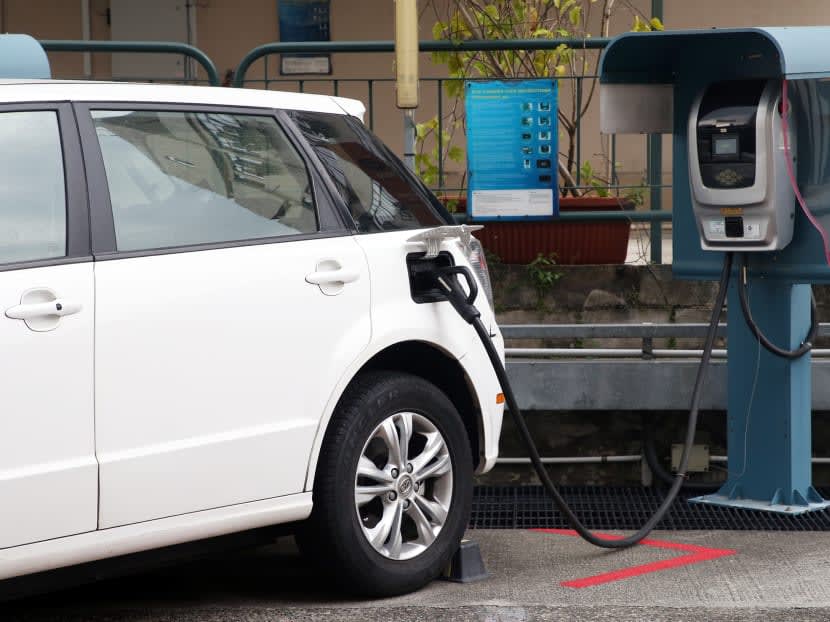What will persuade S'poreans to adopt electric vehicles? Study launched to identify most effective 'nudges'
SINGAPORE — A study was launched on Thursday (Aug 18) to understand the most effective ways to get Singaporeans to adopt electric vehicles (EVs).

- NUS and OCBC bank launched a study to understand the factors that best influence Singaporeans' adoption of electric vehicles
- The study will involve 32,000 OCBC customers over three months
- Customers will be given various types of information about transiting from a petrol to electric vehicle, such as tax and maintenance cost
- The research team will observe how these customers respond to the different types of information given
- A research paper on the study will be released in the second quarter of 2023
SINGAPORE — A study was launched on Thursday (Aug 18) to understand the most effective ways to get Singaporeans to adopt electric vehicles (EVs).
The study, a collaboration between OCBC bank and the National University of Singapore (NUS), will track the perception of 32,000 of the bank's customers over the next three months.
It is Singapore's "largest, dedicated study to understand the most effective nudges to adopt EVs by Singaporeans," OCBC and NUS said in a joint press release on Thursday.
“Through the study, OCBC and NUS aim to uncover nudges that best push consumers to make the switch to EVs, such as concerns over cost of EV ownership in the long-run, or climate-damaging carbon emission levels of petrol and diesel vehicles,” they added.
Speaking to the media at the launch of the study at the OCBC Centre in Raffles Place, Associate Professor Alberto Salvo, who is from NUS’ economic department and is heading the NUS research team, said that there is “a gap in awareness about the current costs and benefits of making the transition” from petrol vehicles to EVs.
To facilitate the research, customers involved in the study will be provided different information on adopting EVs.
The customers taking part in the study will be selected on the basis of having a high likelihood of replacing their cars in the coming years, such as whether they now have a vehicle loan.
The information provided to customers in the study will include the price of buying an EV compared to a petrol car, energy prices, as well as the maintenance cost of EVs and petrol cars.
“We are preparing information about the whole transition — the choice of going from petrol to electric — and the main idea is to see how people respond and if they make the choice to transit,” Assoc Prof Salvo said.
“We are preparing information about the whole transition — the choice of going from petrol to electric — and the main idea is to see how people respond and if they make the choice to transit.Associate Professor Alberto Salvo, head of the National University of Singapore's research team”
Assoc Prof Salvo declined to reveal the channels through which customers will be provided information, because knowing so could influence their behaviour.
Customers will also not be made aware of their participation in the study for the same reason.
He stressed that all information provided will be truthful and taken from the public domain. Data collected from the study will also be anonymous, he added.
The bank and the university will then gauge the persuasiveness of the different factors by studying anonymised data from the customers, including their transit spending and fuel purchases on OCBC bank cards.
“And (based on the information provided)... we observe them down the road to see what their choices are and to understand which of the factors, when made salient, they best respond to,” Assoc Prof Salvo said.
A research paper on the study will be released in the second quarter of next year.
In their press release, NUS and OCBC said that the findings will help business and organisations accelerate consumers’ adoption of EVs, and also support Singapore’s push to electrify its vehicle population by phasing out petrol and diesel vehicles by 2040.
Figures from the Land Transport Authority show that EVs make up less than 1 per cent of Singapore’s total car population currently.
Mr Sunny Quek, the head of consumer financial services in OCBC's Singapore office, said that the bank will be able to use these insights in various ways, such as through developing more persuasive and targeted communications to potential EV owners and to make the bank’s green products more suitable for customers.











